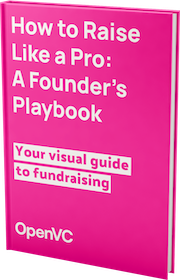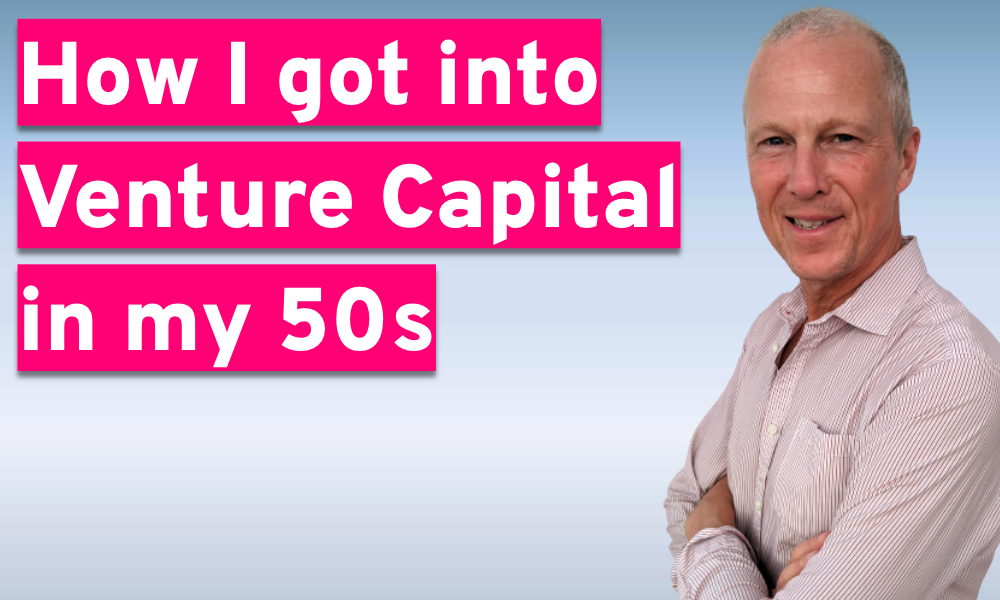What comes after sufficient funding has been provided?
It is a known fact that many startups spiral into failure as they are overwhelmed by what follows when their business starts to take off. It is evident that there is a need for an investor that not only adds value during the funding stage, but continues to do so as the startup matures.
Table of Contents
Too many hats, too little time
It is a recurring pattern that can be observed that founders are often forced to wear ‘too many hats’ and are obliged to take upon the responsibility for too many aspects of the business, which naturally stray them away from the important areas of growth and development.
A founder may be equipped to deal with several complications at once, but that doesn’t mean that they have the professional expertise to deal with them optimally. Fundraising, marketing, business development, and hiring are some of the areas of the business that require utmost attention and precision.
However, it wouldn’t be uncommon to find a founder who is not an expert in all these technicalities. It is not feasible for an individual to be well equipped with all these skills, and even if one is, it is extremely difficult to execute the necessary operations at the highest level.
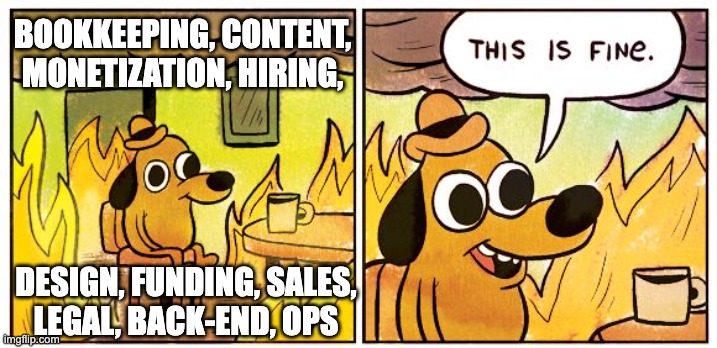
There is a need for an investor who not only provides the necessary capital, but sincerely believes in the idea and continues to offer support following the funding stage. The founders face important pieces they don’t have expertise in, therefore there’s a need for strategic investors that provide more than just funding. Many founders have to juggle when they don't have the expertise so there is a need for investors who can fill in those value gaps.
Enough with the backseat drivers
First off, let’s not forget about the most ongoing challenge any early stage company faces: funding. Twenty-nine percent of startups fail due to cash runout (CBInsights). It should come as no surprise that when founders approach VCs, the top priority is, quite literally, the money; but before long, early stage founders will find themselves overwhelmed by the long list of things that scream for their attention: business development, talent acquisition, product market fit, marketing, fundraising, regulatory issues, and the list goes on. In many cases, first-time founders face an unknown path ahead, and there are a million different ways to fail. For that reason, sailing through the deep waters of today’s startup world requires founders to be intentional about who they take their money from — to look for, not just money, but “smart money.”
Finding “smart money” is not the equivalent of inviting a group of backseat drivers who constantly tell founders what to do with their own brainchild. Too much “advice” from VCs and angel investors could be suffocating for founders. At the end of the day, no one knows a company better than the founders do, but you’ll be surprised how much more important outside critiques and skill sets have grown to be in today’s market. 42% of startup failures are due to misreading market demand; a weak founding team accounts for 23% of startup failures, and 19% of startups are defeated by competition ( CBInsights). If there’s any lesson to be learned from these numbers, it’s that VCs merely writing checks is no longer enough to meet the challenges faced by founders navigating today’s startup landscape.
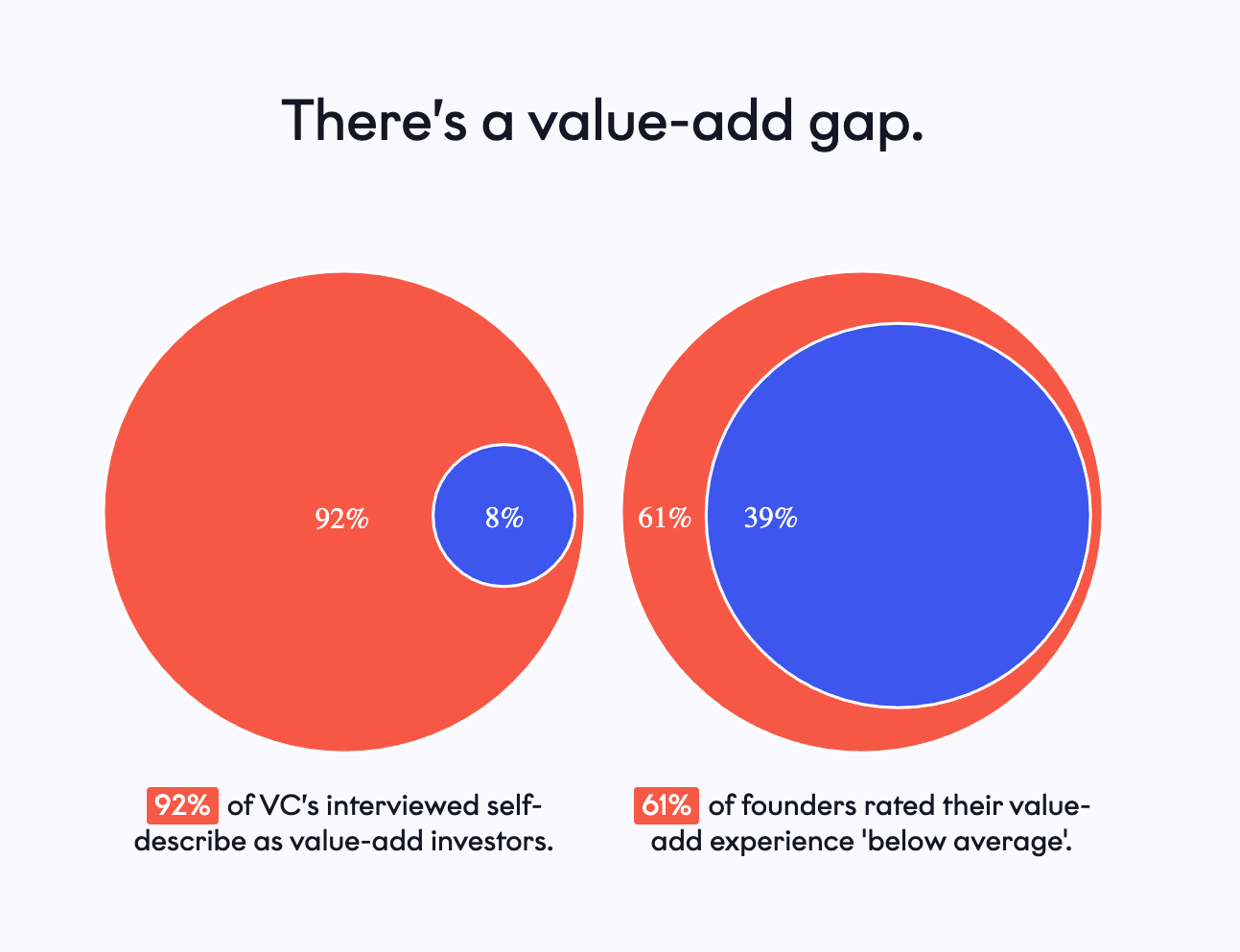
VCs have to add other values: it could be providing strategic consulting that helps founders better interpret market demand and pivot accordingly; it could be appointing founder-turned-investors on their team as advisors to help complement the skillset the founding team is lacking; it could even be sharing their own network of other VCs with portfolio companies to help raise their next rounds. The point is, there are so many ways VCs can add value other than just writing checks.
Value-add takes effort from both sides
To address the specific needs of founders, investors need to have a strong understanding of what that founder is struggling with so that they can utilize their network and resources to help address pain points.
For investors, it is important to have a strong understanding of what specific areas that you are best positioned to add value to your investments. Once an investor has an outline for its value-add approach, the firm can develop targeted practices that will help founders be successful in that area. This practice will allow investors to enhance their pitch by addressing ways they can assist in a founder’s success outside of just writing them a check.

The responsibility is not entirely on the VC, however. On the startup side, founders must have an understanding of their startup’s needs beyond funds. As a founder begins their fundraising process, founders should identify key business development points that they have been struggling with. With a list of pain points in mind, founders should then use resources like Crunchbase, Failory, and OpenVC which have extensive databases of investors and accelerators for a variety of startups. These websites allow you to filter your search to find investors that match your ideal type of investor (Angel, VC, Accelerator, etc.), stage, equity range, industry, and value-add type.
Then, when meeting with investors during your Seed and Series A rounds come prepared with not only a pitch, but a list of needs and issues that you wish to address in that round of fundraising. This may contradict the traditional notion that founders must find the funds they need no matter what, but by identifying early-stage investors who can help assist with a specific aspect of business development, founders have the opportunity to enhance the success of their startup in the long-run. Eventually, as founders hone their search for fundraising, and investors identify where they can add value, the relationship between founders and investors can develop into one that is mutually beneficial, increasing the likelihood of success for the startup and increasing the returns of investors.
My list of true value-add investors
While founders may often be aware of their needs, it can be difficult to find value-add VCs while continuing to raise funds. Based on my own personal experience in the field, here is a list of firms that go beyond a check and help founders address various aspects of startup development.
LvlUp Ventures
LvlUp Ventures is an industry-agnostic, non-traditional hybrid VC investing in great teams with strong initial market validation. LvlUp refers to themselves as an early-stage value add investor, that “upcelerates" businesses, assisting with growth, fundraising and mentorship support. LvlUp companies go through a virtual, non-date specific program that cuts acceleration fluff to put emphasis on what all teams need most: sustainable, scalable growth + help closing fundraising rounds now and in the future. LvlUp also pairs founders with a mentor that is brought on to address a specific need a founder has. This mentor is incentivized to help the startup succeed by being granted equity in the company out of LvlUp’s share.
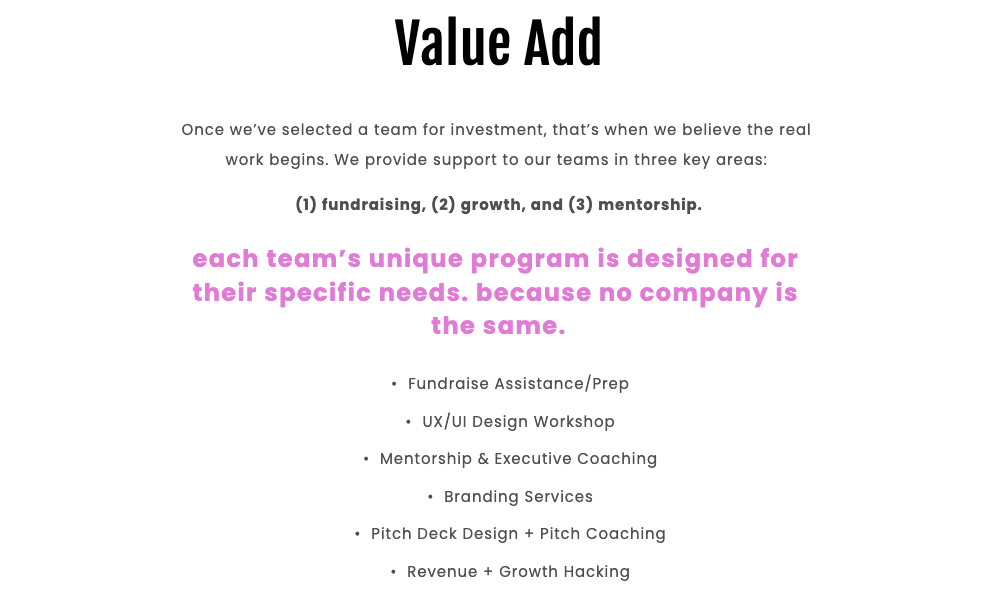
Space Cadet
SpaceCadet refers to themselves as The Marketing VC. The firm offers a full suite of creative services that help you develop an identity as a company, a brand strategy, and how to best reach your target market.

SignalFire
SignalFire is considered to be the first Venture Capital firm that is built like a tech company. The firm is composed of data scientists and engineers who use software to create a startup database which they then extend to founders to help them make an impact on their business. SignalFire also has a Portfolio Support team which is specifically designed to help portfolio companies with recruitment optimization, executive recruiting, Go-to-Market Strategy, finding industry events, and making introductions to industry experts.

Tusk Ventures
Tusk Ventures is helping startups navigate the regulatory landscape of their industries. The firm has access to what they refer to as “patient capital” which allows them to invest in companies that have large addressable markets but may face certain regulatory hurdles. Their portfolio includes a list of successful companies that faced regulation such as Coinbase, Bird, and Uber.
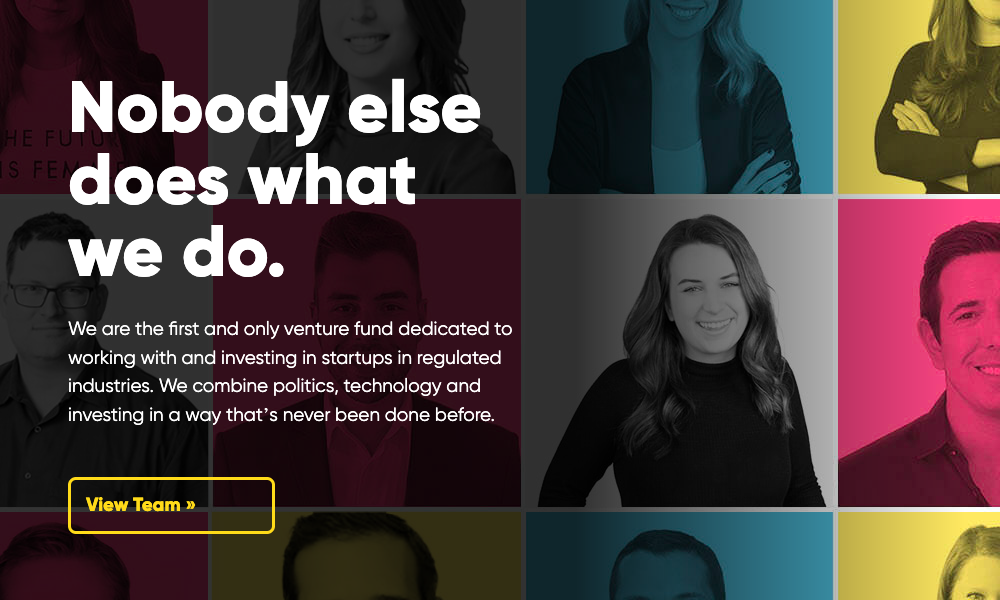
Accelerators
Accelerators are often overlooked when it comes to looking for value-add investors. While some accelerators can be generalized and unhelpful, there are many great accelerators out there that offer a wide variety of different resources such as personalized mentorship, investor networks, and educational workshops. The level of specificity of these resources is up to the founder and their needs. Depending on the accelerator, you may have to give up some equity in your company or pay to participate in the program, but many accelerators also offer investment to some of the startups in their program.
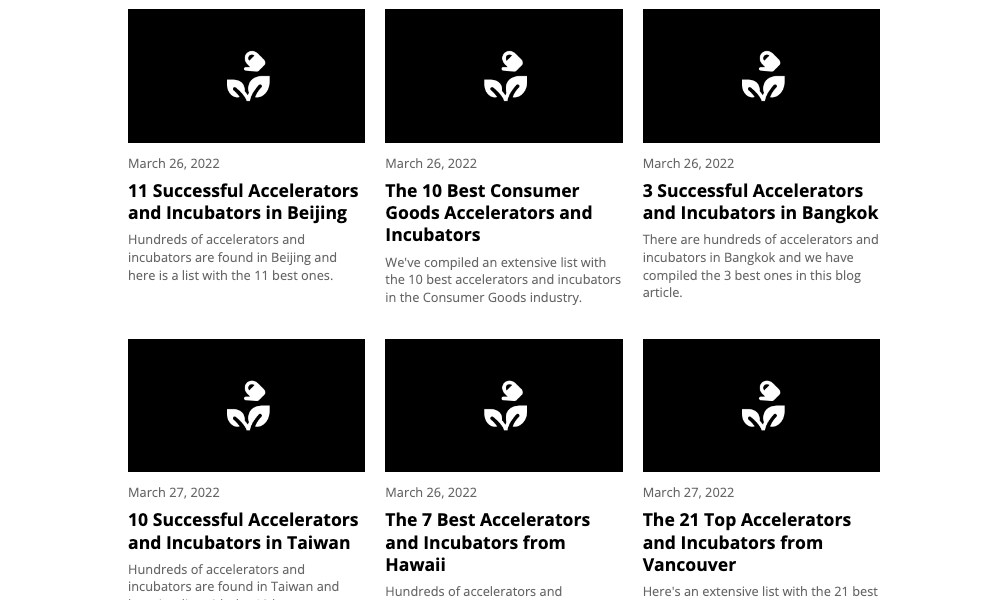
Other options
There are many different investors out there aside from traditional VCs and accelerators. Angel investors are well-suited for mentorship and adding value as they often have industry expertise from working on past startups or playing a high level role at a company. There are also corporate accelerators which give a great opportunity to leverage their corporate networks and resources.
For a more exhaustive list of innovative and value-add investors, check out this article by Stefano Bernardi.
Conclusion
Navigating the fundraising process can prove to be difficult and strenuous. As mentioned before there are a plethora of resources available to acquire funding such as Crunchbase and Failory that entail several investors, VCs, Private Equity firms, Hedge Funds, and Accelerators. However, the fact that resources are available should not undermine the difficulty of the process of fundraising and other important aspects that require utmost efforts. For that reason, there has been a lot of growth in the need for value-add investors and hence the need for value-add investors is evident. With that said, it’s imperative that the founder is aware of the major pain points and asks the right questions in order to ensure that the gaps are filled.
Founders should be able to measure and personalize the value-add support they’re receiving from investors and pursue the direction they feel is necessary for growth and address areas where they don’t have expertise. Cabal, for example, is a great tool that allows founders to tie the cap table to actual value-add created by investors. The future could definitely entail founders of startups requiring quantified, tangible, and programmatic value-add.
About the author
Brandon Maier is a serial entrepreneur and investor with over 10 years of experience in the startup and venture space.
Brandon has served as a Financial Controller in the early days of crypto for Bitinstant. In 2016, Brandon co-founded a Forbes Top 10 Seed Fund & Accelerator Program, Quake Capital where he has over 200 early-stage investments and 4 exits. Brandon is also the Founder & General Partner at LvlUp Ventures, a new early-stage value-add fund focused on growth, fundraising and mentorship.
Brandon can be reached at [email protected]
Unlock the secrets to startup fundraising 🚀
Use our FREE, expert-backed playbook to define your valuation, build VC connections, and secure capital faster.
Access now